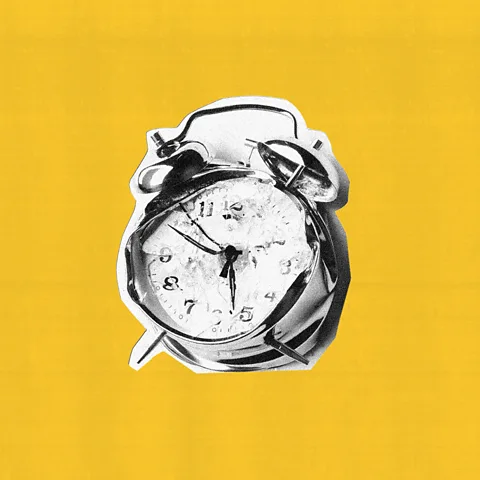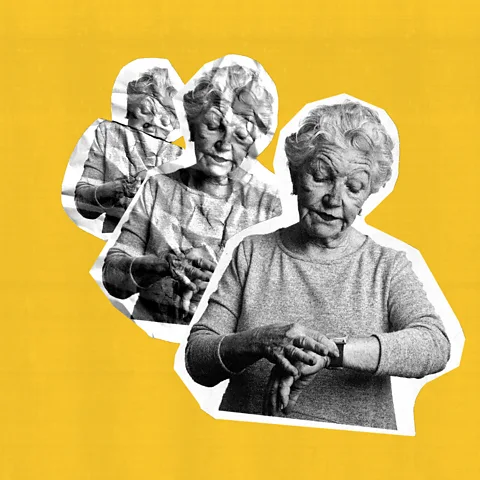How daylight saving time affects your health
 Serenity Strull/ BBC
Serenity Strull/ BBCChanging the clocks is linked to a plethora of health impacts – from heart attacks to car crashes.
As the nights draw in and we get ready to turn the clocks back, we can at least console ourselves with the thought of that extra hour in bed; the chance to snuggle under the duvet for just that bit longer. Getting one whole extra hour in the evening sounds great, after all – think of the things that can be achieved!
However, research shows it perhaps isn't what it's cracked up to be. After all, some studies show a link between the clocks going back in the autumn, and an increased risk of depressive episodes. On the positive side, at least turning the clocks back doesn't appear to be as bad for your health as turning the clocks forward, which is linked to increased heart attacks, strokes and road traffic accidents.
But let's back up a little. Daylight saving time (DST) was first introduced in the UK in 1916 during World War One, as a way to conserve energy and maximise the amount of daylight in the working day. As a result, the clocks go forward by one hour on the last Sunday in March, and backwards one hour on the last Sunday in October.
It isn't just a British phenomenon; around 70 countries and over a quarter of the world's population observe DST. In the US, DST was formally introduced in 1966. Today the clocks go forward on the second Sunday in March and the first Sunday in November.
Increasingly research suggests that clock changes may adversely affect people's health. The strongest evidence relates to pushing the clocks forward in spring, which makes the mornings darker and the evenings lighter, and robs people of an hour of sleep.
In 2014, researchers in the US found that the number of people admitted to hospital with a heart attack soared 24% the Monday after the clocks were put forward. This finding has also been found in studies in Sweden, Croatia, Germany, Brazil, Finland and Mexico. A meta-analysis which pooled the results from all available studies calculated that the average number of heart attacks following the onset of DST in the spring appears to rise by a modest but significant 4%.
That isn't all. Other studies have shown that the number of strokes increases in the weeks immediately following putting the clock forward. While you might imagine that getting more light in the evening would be beneficial to mental health, that too has been challenged, with a 2020 study finding that the shift to daylight saving time exacerbates mood disorders, depression, anxiety and substance abuse.
Then we come to the issue of road traffic collisions. In the US, fatal car accidents have been shown to increase in the weeks following the spring clock change. One study estimated that moving the clocks forward in spring increased the risk of fatal traffic accidents by 6%, which the researchers attribute to the nation struggling with being robbed of one hour of sleep.
 Serenity Strull/ BBC
Serenity Strull/ BBCBut why does shifting the clocks forwards have such a profound effect? The reason is that it wreaks havoc on the body's circadian rhythms – the inbuilt 24-hour clock each of us has that tells us when it's time to go to sleep and time to wake up.
The main signal our brain uses to synchronise its internal clock is sunlight. At night, falling light levels cause the brain's pineal gland to produce melatonin, which tells us to start feeling sleepy. Conversely, in the morning as light shines through the curtains, our brains stop producing melatonin and start releasing cortisol instead, leading to a state of wakefulness.
The problem with turning the clock forward in the spring is that there is more light in the evening at bedtime. This interferes with melatonin production, making it harder to fall asleep. Darker mornings also mean people get up before they have had a chance to wake naturally.
And losing that one hour of sleep on the night of the spring transition can have a cumulative effect on sleep loss, leading to increased sleep fragmentation across the following week.
A 2024 study, however, explored the effects of DST clock changes on the sleep duration of over 11,000 people in the UK. It found that while mean sleep duration was 65 minutes lower on the Sunday of the springtime clock changes than the previous Sunday, there was evidence of catch-up sleep after the transition.
"Left to themselves, our internal circadian clocks naturally align with the light dark cycle, so the only problem comes if you start arbitrarily defining time based on a clock," says David Ray, professor of endocrinology and co-director of the Sir Jules Thorn Sleep and Circadian Neuroscience Institute at the University of Oxford.
''Because then you'll have people who are being asked to live their lives against the clock. Their internal clock tells them it's 7am, but the clock on the wall says it's 6am so they're one hour misaligned. Now you might think that's only a very small difference, but if you look in large enough numbers of people, you start to see that there are problems," Ray says.
People who could be described as "living their lives against the clock" include shift workers.
Research shows that people who do shift work have much higher rates of mental and physical illness. They have increased rates of diabetes, obesity, coronary heart disease and cancer. Shift workers also die earlier on average.
 Serenity Strull/ BBC
Serenity Strull/ BBCEven small changes can have a measurable impact. For example, people who live on the western edge of time zones are also at increased risks of the same conditions as shift workers. Sleep scientists say that this is because your body clock is constantly misaligned by almost an hour if you live at the very extreme westward end of a time zone. This suggests that daylight savings could have a similar long-term impact on people's health, although this hasn't been proven.
"The net result [of DST] is it's making people get up an hour earlier, and that means that we're really for the whole six months asking people to live about one hour misaligned," says Ray.
"Even one hour carries a certain risk, and of course, if you do it to a whole population, even with a small risk applied to 60 million people, you'll be dialling up quite a lot of disease that is completely avoidable."
More like this:
• How microbes control your sleep
• The forgotten medieval habit of 'two sleeps'
• Should you shower in the morning or at night?
So what about shifting the clocks back in autumn? You might think that getting an hour extra in bed would have untold health benefits. But that doesn't appear to be the case. Firstly, it doesn't appear that people are capitalising on the full hour. In fact, people only sleep on average 33 minutes longer on the Sunday of the autumn clock changes compared to the Sunday before – and then continue to lose sleep for the rest of the week.
Some studies also show a link between the clocks going back in the autumn, and an increased risk of depressive episodes. Researchers in Denmark looked at data from the Danish Psychiatric Central Research Register from 1995 to 2012. They found that in the 10 weeks after the clock change, the incidence of major depressive episodes increased by 11%.
However, Joan Costa-i-Font, professor of health economics at the London School of Economics and Political Science (LSE), believes there are some health benefits to the autumn transition. He tracked 30,000 individuals over a 30-year period from 1984 to 2018. Respondents were routinely asked questions about their life and sleep satisfaction, their physical and emotional health, and their wellbeing. The results showed that there are benefits associated with the autumn clock change, but that they were not strong enough to outweigh the negatives in the spring.
"We found that the autumn transition benefited health because it allowed people to sleep about 40 minutes more," says Costa-i-Font. "People had more energy, and they felt better and happier."
However overall, because of the negative effects of the spring clock change, there was still a significant cost to individual health and wellbeing. Costa-i-Font found that moving clocks forward in the spring decreased life satisfaction by around 1.44%, and had detrimental effects on sleep, feelings of fatigue, and stress. The study concluded that changing the clocks twice a year costs economies over €750 ($881, £655) per capita each year.
"Most people think that it doesn't matter – after all it's just an hour – but the problem is that everyone's schedule shifts by an hour and that is disruptive," says Costa-i-Font.
So, should we get rid of daylight saving time altogether? The European parliament voted to do just that in 2019 but has yet to implement the change. The problem is that different countries are divided on which time to set. The majority prefer summertime, however, that goes against what scientists recommend.
"Most circadian biologists take the view that that actually the winter clock times are probably better for us," says Ray. (Read more about why we need more sleep during the winter).
In the darkness of autumn evenings, as we get ready to turn the clocks back, you can at least console yourself with the knowledge that darker evenings means better sleep, something we all need more of.
--
For trusted insights into better health and wellbeing rooted in science, sign up to the Health Fix newsletter, while The Essential List delivers a handpicked selection of features and insights.
For more science, technology, environment and health stories from the BBC, follow us on Facebook and Instagram.
